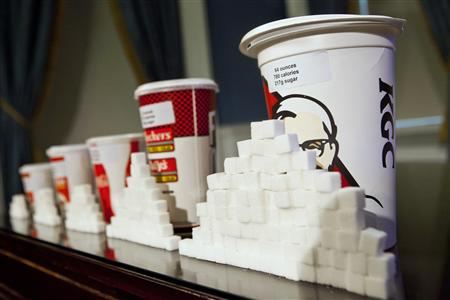 New York City Mayor Michael Bloomberg vowed on Monday to appeal a judge’s ruling that struck down his pioneering ban on large sugary drinks sold by the city’s restaurants, movie theaters and other food service businesses just a day before it was to take effect.
New York City Mayor Michael Bloomberg vowed on Monday to appeal a judge’s ruling that struck down his pioneering ban on large sugary drinks sold by the city’s restaurants, movie theaters and other food service businesses just a day before it was to take effect.
The judge called the ban “arbitrary and capricious” in an 11th-hour decision that dealt a serious blow to Bloomberg, who has made public health a cornerstone of his administration, with laws prohibiting smoking in restaurants, bars and parks; banning trans fats; and requiring chain restaurants to post calorie counts.
At a press conference, Bloomberg said the judge’s ruling was “totally in error” and promised to keep pressing his effort to combat a growing obesity epidemic linked to heart disease and diabetes. He has successfully fought off past court challenges to thesmoking ban and the calorie count rule.
“Anytime you adopt a groundbreaking policy, special interests will sue,” Bloomberg said. “That’s America.”
It is unclear whether the case will be resolved by the time Bloomberg’s term expires at the end of this year.
Beverage manufacturers, restaurants and other business groups had called the so-called “soda ban” an illegal overreach that would infringe upon consumers’ personal liberty.
The regulation would have prohibited the city’s food-service establishments from selling sugary drinks larger than 16 ounces (473 ml) starting on Tuesday, though city officials had said they would not begin imposing $200 fines on offending businesses until June.
“People are dying every day,” Bloomberg said. “This is not a joke. This is about real lives.”
But the ban only applied to businesses under the auspices of the health department, since it was the mayor-appointed health board, and not the city council, that approved the policy last fall. That meant that grocery and convenience stores – including 7 Eleven and its 64-ounce Big Gulp – were exempt from the regulation’s reach.
In his ruling, state Supreme Court Justice Milton Tingling in Manhattan zeroed in on the loopholes, noting it would only have applied to businesses that are under the purview of the health department, like restaurants, and would allow sweetened milk-based drinks like milkshakes.
“It is arbitrary and capricious because it applies to some but not all food establishments in the city, it excludes other beverages that have significantly higher concentrations of sugar sweeteners and/or calories on suspect grounds, and the loopholes inherent in the rule … serve to gut the purpose of the rule,” he wrote.
He also expressed concern that to allow the health board such sweeping authority would “eviscerate” the separation of powers between the executive and the legislature branches of city government.
Chris Gindlesperger, a spokesman for the American Beverage Association, which brought the lawsuit on behalf of companies such as Coca-Cola, PepsiCo and Dr Pepper Snapple, said the ruling was a “sigh of relief” for New Yorkers and small businesses throughout the city.
Dawn Sweeney, CEO of the National Restaurant Association, which joined the lawsuit as a plaintiff, said the decision would save thousands of restaurants and suppliers from unnecessary costs.
But beverage industry consultant Tom Pirko of Bevmark Consulting in Santa Barbara, California, said the ruling could backfire if it convinces municipalities that the only way to reduce soda consumption is through higher taxes.
“What the industry is very worried about is not measures like Bloomberg’s, which is local and easy to walk around. What they’re worried about is taxes,” he said.
In anticipation of the soda ban, Bloomberg on Monday released new data tying sugary drinks to the city’s fattest neighborhoods, though the ABA was quick to criticize its methodology.
Meanwhile, fast food restaurants and cafes had been scrambling on Monday to comply with the looming deadline. Many were confused over whether the rules applied to popular sweetened coffee drinks, underlining the ban’s uneven applications.
McDonald’s Corp said customers ordering a large coffee would be handed as many packets of sugar as they like on the side, to be poured into the drink at the customer’s leisure.
By contrast, Dunkin’ Donuts, which had been handing out leaflets to explain the law’s impact on its menu, decided its servers would hand over large drinks unsweetened and simply direct customers to a self-serve stand where sugar and flavored syrups are kept.
Public sentiment on the ban had appeared divided, with a Marist University poll last summer showing 53 percent of New York City adults against the ban and 42 percent in favor.
“The mayor took a bullet and now we’ll wait for the next big Bloomberg health initiative,” said Professor Douglas Muzzio of Baruch College. “He’s not going to stop.”
Last month, Bloomberg proposed a ban on polystyrene foam, the packaging material that is widely popular for take-out food but is almost impossible to recycle.
(Reporting by Joseph Ax; Additional reporting by Jonathan Allen, Lisa Baertlein, Chris Francescani, Martinne Geller and Edith Honan; Editing by Paul Thomasch, David Gregorio and Richard Chang) Article from Yahoo News.
